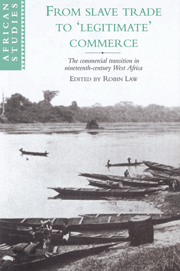 From Slave Trade to 'Legitimate' Commerce
From Slave Trade to 'Legitimate' Commerce Book contents
- Frontmatter
- Contents
- List of contributors
- List of abbreviations
- Introduction
- 1 The initial ‘crisis of adaptation’: the impact of British abolition on the Atlantic slave trade in West Africa, 1808–1820
- 2 The West African palm oil trade in the nineteenth century and the ‘crisis of adaptation’
- 3 The compatibility of the slave and palm oil trades in Dahomey, 1818–1858
- 4 Between abolition and Jihad: the Asante response to the ending of the Atlantic slave trade, 1807–1896
- 5 Plantations and labour in the south-east Gold Coast from the late eighteenth to the mid nineteenth century
- 6 Owners, slaves and the struggle for labour in the commercial transition at Lagos
- 7 Slaves, Igbo women and palm oil in the nineteenth century
- 8 ‘Legitimate’ trade and gender relations in Yorubaland and Dahomey
- 9 In search of a desert-edge perspective: the Sahara-Sahel and the Atlantic trade, c. 1815–1900
- 10 The ‘New International Economic Order’ in the nineteenth century: Britain's first Development Plan for Africa
- Appendix The ‘crisis of adaptation’: a bibliography
- Index
2 - The West African palm oil trade in the nineteenth century and the ‘crisis of adaptation’
Published online by Cambridge University Press: 21 September 2009
- Frontmatter
- Contents
- List of contributors
- List of abbreviations
- Introduction
- 1 The initial ‘crisis of adaptation’: the impact of British abolition on the Atlantic slave trade in West Africa, 1808–1820
- 2 The West African palm oil trade in the nineteenth century and the ‘crisis of adaptation’
- 3 The compatibility of the slave and palm oil trades in Dahomey, 1818–1858
- 4 Between abolition and Jihad: the Asante response to the ending of the Atlantic slave trade, 1807–1896
- 5 Plantations and labour in the south-east Gold Coast from the late eighteenth to the mid nineteenth century
- 6 Owners, slaves and the struggle for labour in the commercial transition at Lagos
- 7 Slaves, Igbo women and palm oil in the nineteenth century
- 8 ‘Legitimate’ trade and gender relations in Yorubaland and Dahomey
- 9 In search of a desert-edge perspective: the Sahara-Sahel and the Atlantic trade, c. 1815–1900
- 10 The ‘New International Economic Order’ in the nineteenth century: Britain's first Development Plan for Africa
- Appendix The ‘crisis of adaptation’: a bibliography
- Index
Summary
The idea that parts of West Africa experienced a ‘crisis of adaptation’ in the nineteenth century with the transition from the slave trade to what was termed at the time ‘lawful commerce’, has been one of the most debated issues in West African historiography. This concept goes back a long way but in recent years it has been the writings of A. G. Hopkins that have most fully spelt out what it entailed. For Hopkins, the transition from slave-trading to produce-trading had serious political consequences for parts of West Africa, which culminated in a ‘crisis of adaptation’ which in turn led on to British imperial intervention. As is well known, however, not all historians of the area have been convinced by Hopkins' analysis. Austen, indeed, describes the transition as ‘adaptation without revolution’, and many writers have questioned whether it amounted to a ‘crisis’ in any meaningful sense. The ensuing debate has been a compelling one for historians of the region, with numerous case studies being produced to show the validity of one side or other. However, as Law has implied in his recent survey of writings on this topic, something of a consensus might now be said to have developed. Few historians, he suggests, now argue for a ‘crisis of adaptation’ in the coastal trading states of West Africa in the nineteenth century.
- Type
- Chapter
- Information
- From Slave Trade to 'Legitimate' CommerceThe Commercial Transition in Nineteenth-Century West Africa, pp. 57 - 77Publisher: Cambridge University PressPrint publication year: 1995
- 30
- Cited by


